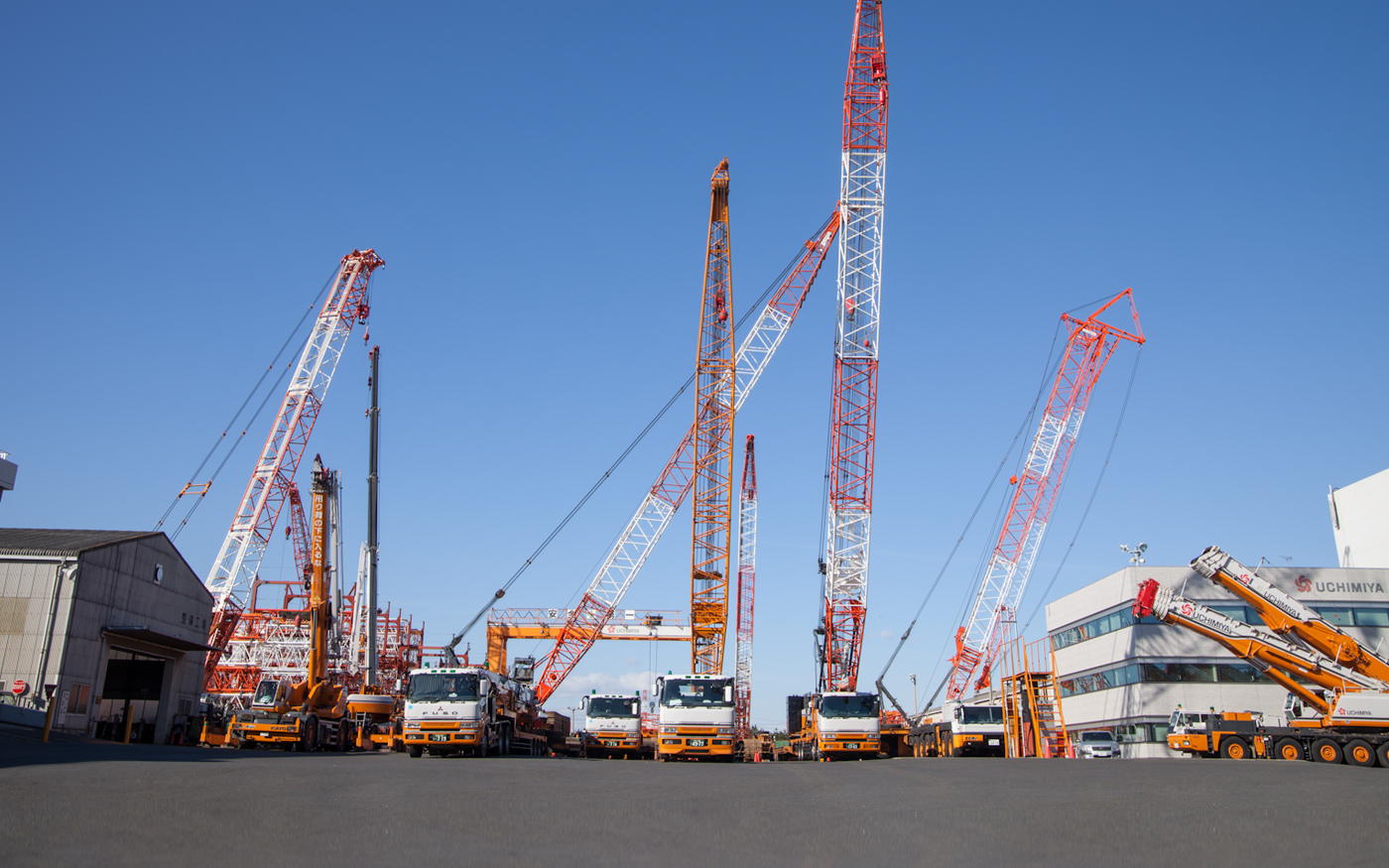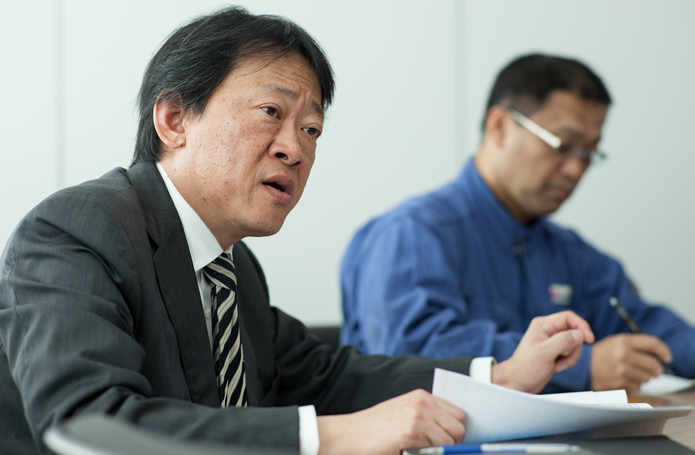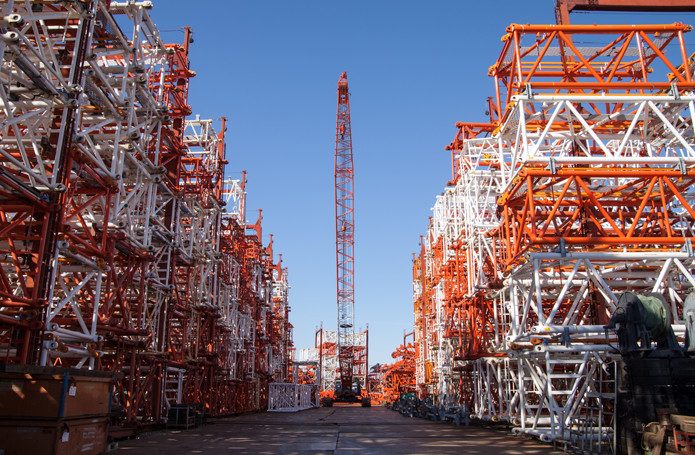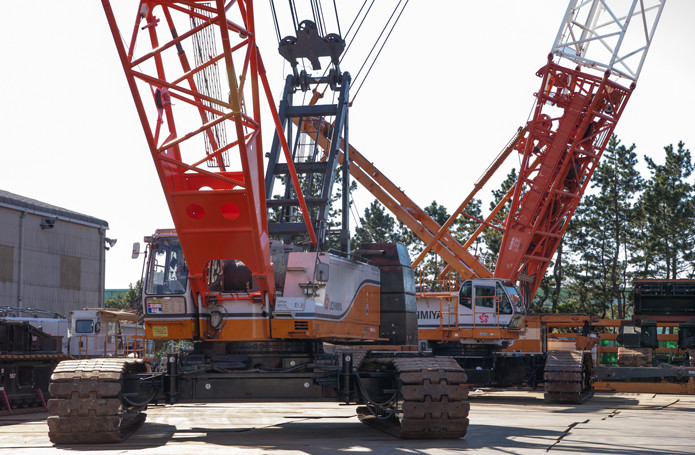
A day on site
December 2013
Cranes and those operating them
We asked the operator of a large-sized SL-13000 crane about his workday.
 Mr. Toshiyuki Uchimiya
Mr. Toshiyuki Uchimiya
Senior Managing Director
Uchimiya Transportation and Engineering Co., Ltd.
Professional: Uchimiya Transportation and Engineering Co., Ltd.
We wanted to meet some of the world’s leading crane owners, so we went to the Chiba Machinery Centre of Uchimiya Transportation and Engineering (UCHIMIYA). The company was established in 1953, which made 2013 its 60th anniversary year. UCHIMIYA is tops in its class, with 320 employees and some of the largest domestic cranes available: 69 crawler cranes, 25 all-terrain cranes, 69 two-axle rough terrain cranes—a total of 163. It also owns a huge fleet of other transport vehicles, and as construction sites grew in size, they acquired large unit carriers. In other words, UCHIMIYA keeps up with the times. We spoke to Senior Managing Director Toshiyuki Uchimiya.

The concept of UCHIMIYA is “Heavy Machinery/ Transport/Construction.” Originally our business was mostly land transport with wagons. The monument to Hayagriva that stands in front of our headquarters building is a relic from that time. After the war, we were one of the first to get movable cranes allowing us to load very heavy items. In the mid-1950s, our business grew beyond just transport to offloading and installation. We are known as the pioneers of the specialist heavy machinery industry.
Our first president said, “From now on, it will be a crane age.” He truly believed that and started buying cranes. As the company grew, construction sites became more intricate and civil engineering work more complicated, with large projects like removing the temporary structures holding up bridge segments. We had the opportunity to participate in many of these projects. Now many of these projects are overseas.
 Uchimiya Transportation and Engineering Co., Ltd.’s Machinery Centre in Chiba Prefecture, where a huge lineup of heavy machinery is kept clean and orderly.
Uchimiya Transportation and Engineering Co., Ltd.’s Machinery Centre in Chiba Prefecture, where a huge lineup of heavy machinery is kept clean and orderly.
UCHIMIYA is called a pioneer, and it has earned the respect of other companies in the same industry. Of course, there are more reasons for this respect. For example, UCHIMIYA is strict when it comes to keeping things clean and perfectly in order —a masterful spectacle.
“Handling heavy machinery carefully has become an important habit with us. Our founder always taught us that messy sites resulted in accidents. If everything is in its proper place, that means, the hearts of the people working the site are in the right place, too.”
It’s not easy to keep a busy work site clean and in order, so what is the motivation to do something like that?
“Each piece of heavy machinery is given a number, and employees use the machines as if they personally owned them. That means they keep the machinery clean and use it with care. If they take proper care of their machinery, it will help them accomplish dangerous jobs. If they treat them carelessly, it seems heartless, but the machine will not help. I suppose that goes without saying.”
 Well cleaned and carefully maintained heavy machinery
Well cleaned and carefully maintained heavy machinery
Also, UCHIMIYA puts a lot of effort into personnel training. Because the company believes that training young people enables them to contribute to society for their entire lives.
“Communication is essential these days, and that is true of people who work at construction sites, too. Personnel have to know what needs to be done, how to communicate with customers, and how to confirm every step in the process. And that leads to safety on site.”
Safety on site. That’s the most important thing to UCHIMIYA, and that’s why we emphasise communication skills in our training.
“The slightest mistake can cause a very serious accident because of the size of the machinery we operate. We think safe construction sites are the result of good communication. Still, at times, when many companies are involved in a project, communication becomes difficult. That makes it doubly important to plan carefully, and to turn a difficult situation into the best possible site. The ability to do that connects directly to site safety.”
Further, it is also important to take good care of our people, who put so much into their work. We must maintain good relations with customers and with our own people. At UCHIMIYA, that is basic.